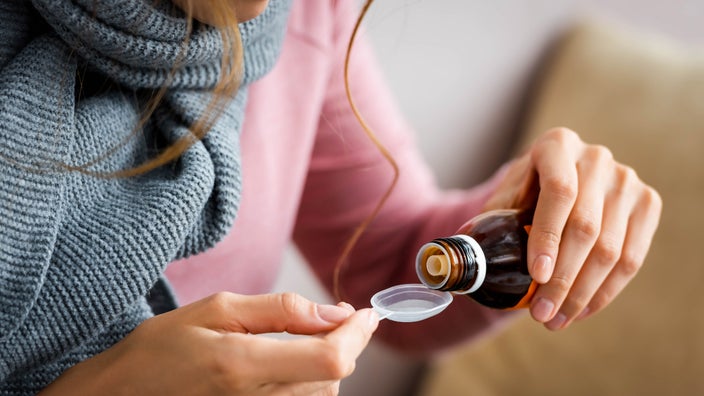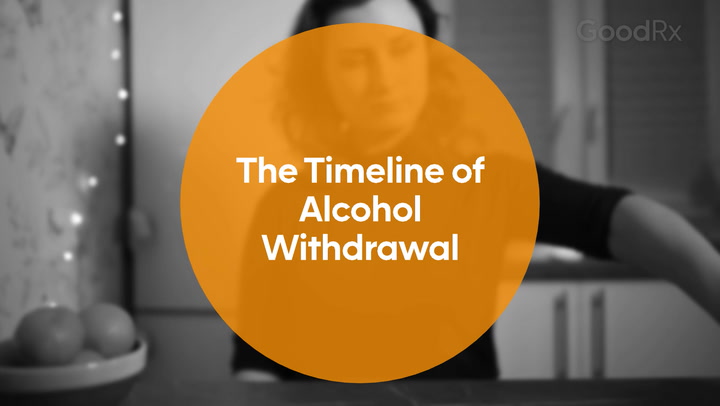
Dextromethorphan Misuse: Understanding the Dangers of a Cough Syrup High
Key takeaways:
There are various types of over-the-counter cough syrups, and many contain dextromethorphan.
Dextromethorphan (Delsym) has very few side effects when used according to the directions. But cough syrup can be misused in an attempt to get high. Teens may be particularly vulnerable to misusing cough syrups containing dextromethorphan.
High doses of dextromethorphan can cause hallucinations, out-of-body experiences, and trouble balancing. But they can also lead to trouble breathing, seizures, and dangerous heart problems.
Access savings on related medications
Table of contents

Misuse of over-the-counter (OTC) cough syrups is a known issue, especially amongst teens. According to Poison Control, cough syrups containing the ingredient dextromethorphan lead to about 6,000 emergency room visits each year.
If you have cough syrup in your home, it’s important to know which ones have the potential to be misused as well as the risks involved.
OTC cough syrup ingredients
Some of the most common ingredients in OTC cough syrups include guaifenesin (Mucinex) and dextromethorphan (Delsym).
Search and compare options
Guaifenesin is an expectorant. This means it helps you cough up mucus easier if you have a productive (“wet”) cough. Dextromethorphan is a cough suppressant. It typically works better for a non-productive (“dry”) cough.
OTC cough syrups may contain guaifenesin, dextromethorphan, or both. They may also contain other ingredients, such as antihistamines and/or pain relievers.
Are some types of cough syrup more dangerous than others?
The typical ingredients in most cough syrups — guaifenesin and dextromethorphan — have few side effects when used according to the package instructions. But what happens if they’re misused?
Guiafenesin is considered a very safe medication. It typically causes no side effects. It also doesn’t carry a great risk of being misused. Some rare side effects include headache, nausea, and vomiting. If you experience any side effects after using guaifenesin-only products, you should stop using them and contact a healthcare professional.
Dextromethorphan also usually has no common side effects when taken as directed. Rarely, it may cause nausea, drowsiness, or dizziness at recommended doses.
But dextromethorphan is considered more dangerous than guaifenesin. That’s because it has the potential to be misused. And when high doses are consumed, more dangerous side effects can happen.
Screen your teen: Catching substance misuse early can help prevent long-term health problems.
Teen drug misuse: Understand why it happens and how to help prevent it.
Recovery support: These do’s and don’ts can help guide you in supporting a loved one through their addiction.
Can you get high on cough syrup?
Yes, taking large amounts of dextromethorphan can cause a “high” feeling. Some people intentionally take too much cough syrup to experience this sensation. This is sometimes called "robo-tripping" or "skittling.”
Taking large amounts of dextromethorphan can have a similar feeling to drinking alcohol or using cannabis for some people. But it can also lead to hallucinations, panic, and more serious side effects (more on that next).
Common brand-name OTC cough medicines that contain dextromethorphan include:
Delsym
Robitussin DM (multiple products)
Robitussin Long-Acting CoughGels (dextromethorphan)
Mucinex DM (guaifenesin / dextromethorphan)
Nyquil Cold and Flu (acetaminophen / dextromethorphan / doxylamine)
Dayquil Flu and Cold (acetaminophen / dextromethorphan / phenylephrine)
These are a few common examples. But over 100 different OTC products contain dextromethorphan.
What happens when you take too much cough syrup with dextromethorphan?
The side effects of dextromethorphan are dose dependent. This means that the more you take, the more likely it is for side effects to happen.
The typical dose of short-acting dextromethorphan for adults is 30 mg every 6 to 8 hours. The usual adult dose of long-acting dextromethorphan is 60 mg every 12 hours. As mentioned earlier, taking recommended doses typically causes little to no side effects.
Read more like this
Explore these related articles, suggested for readers like you.
The side effects of taking more cough syrup than recommended is separated into four steps known as plateaus:
First plateau: At this first level of overuse, people typically report feelings of restlessness or euphoria (“feeling high”).
Second plateau: As a person progresses to this step, they may experience heightened sensations or trouble balancing.
Third plateau: At this point, a person may experience hallucinations, slower reaction time, or an out-of-body sensation.
Fourth plateau: If a person takes an extremely high dose, they’re likely to experience delusions (altered perceptions), impaired coordination, and dissociative effects. Dissociative effects can be described as a feeling of being disconnected from your body. Or it can feel like the environment around you isn't real.
Keep in mind that these steps explain how you may feel. But dangerous side effects can happen at any dextromethorphan dose that’s higher than recommended.
What are the dangers of using cough syrup to get high?
Using cough syrup to get high is dangerous. Too much dextromethorphan can lead to serious complications, such as:
A very high fever
Seizures
Heart rhythm problems
High blood pressure
Loss of consciousness
Severe cases of dextromethorphan poisoning can lead to trouble breathing, coma, and fluid build-up around the brain or lungs. If you or someone you know experiences signs of dextromethorphan poisoning, call 911.
Can you overdose on cough syrup?
Yes, too much dextromethorphan can lead to overdose. And it’s possible for an overdose to be fatal. The risk of life-threatening dextromethorphan poisoning is higher if a person is also using sedating medications or substances, such as opioids, benzodiazepines, and alcohol.
Can you have an addiction to cough syrup?
Yes, it’s possible to develop an addiction to cough syrup containing dextromethorphan. While dextromethorphan addiction isn’t an official medical diagnosis, it’s possible to have symptoms that are usually seen with substance use disorder.
Symptoms of substance use disorder could include:
Using a medication for recreational purposes instead of to treat a health condition
Using a substance more often or in greater amounts than intended
Spending a significant amount of time finding, using, or recovering from the use of a substance
Developing tolerance to the effects of a substance
Craving the substance when none is around
Being unable to cut down on using a substance
Stopping normal activities or hobbies in order to obtain or use a substance
Having difficulties at work, school, or home
Using a substance even if it might cause harm
Dextromethorphan misuse can also lead to withdrawal if a person stops using it. Withdrawal symptoms can include vomiting, trouble sleeping, and a racing heart.
Who’s most at risk of misusing cough syrup?
The misuse of dextromethorphan cough syrup is seen at all ages. But teens may be particularly vulnerable to misusing cough syrup to get high.
Efforts have been taken to help lower the number of teens misusing cough syrup. In most states, you must now be at least 18 years old to buy OTC products that contain dextromethorphan. These efforts have been working, as the number of teens who misuse cough syrup has come down in recent years.
Are there safer alternatives to cough syrup?
If you have a productive cough, dextromethorphan typically isn’t helpful. In this case, a cough syrup that has guaifenesin in it may work better. Guaifenesin doesn’t carry the same risk of misuse and overdose that dextromethorphan does.
If your cough is non-productive, reach out to your healthcare team for an alternative to dextromethorphan. There are a few other cough medications to consider, such as benzonatate (Tessalon) or inhalers, such as albuterol (ProAir, Ventolin, Proventil). Together with your healthcare team you can choose a safer option that carries a lower risk of abuse.
Keep in mind that all medications come with risks. So it's always a good idea to keep medications, even OTC products, in a secure place out of the reach of children, teens, and other people who shouldn’t have access to them.
The bottom line
Over-the-counter (OTC) cough syrups are a common way to treat a cough at home. Cough syrups that contain dextromethorphan have very few side effects when used according to the directions.
But taking more dextromethorphan than recommended can cause hallucinations, out-of-body experiences, and trouble balancing. It can also cause dangerous side effects, such as loss of consciousness, seizures, and, in some cases, death. Teens may be at a higher risk for cough syrup misuse. Be sure to keep all medications, including OTC products, away from children and teens.
If you or someone you know struggles with substance use, help is available. Call SAMHSA’s National Helpline at 1-800-662-4357 to learn about resources in your area.
Why trust our experts?



References
Antoniou, T., et al. (2014). Dextromethorphan abuse. Canadian Medical Association Journal.
DailyMed. (n.d.). Search results for Robitussin DM.
Drug Enforcement Administration. (2020). Drug fact sheet: DXM.
Haleon US Holdings LLC. (2024). Robitussin long-acting coughgels [package insert]. DailyMed.
Journey, J. D., et al. (2023). Dextromethorphan toxicity. StatPearls.
Martinak, B., et al. (2017). Dextromethorphan in cough syrup: The poor man’s psychosis. Psychopharmacology Bulletin.
May, M. E. (n.d.). Dextromethorphan abuse. National Capital Poison Center.
MedlinePlus. (2022). Guaifenesin.
Mutschler, J., et al. (2010). Dextromethorphan withdrawal and dependence syndrome. Deutsches Arzteblatt International.
National Institute on Drug Abuse. (2017). Over-the-counter medicines DrugFacts.
Nemours KidsHealth. (2023). Cough and cold medicine abuse.
Oh, S. R., et al. (2023). Dextromethorphan. StatPearls.
Shafi, H., et al. (2016). Deaths due to abuse of dextromethorphan sold over-the-counter in Pakistan. Egyptian Journal of Forensic Sciences.
Spangler, D. C., et al. (2016). Dextromethorphan: A case study on addressing abuse of a safe and effective drug. Substance Abuse Treatment, Prevention, and Policy.
Substance Abuse and Mental Health Services Administration. (2022). Key substance use and mental health indicators in the United States: Results from the 2021 national survey on drug use and health.




























